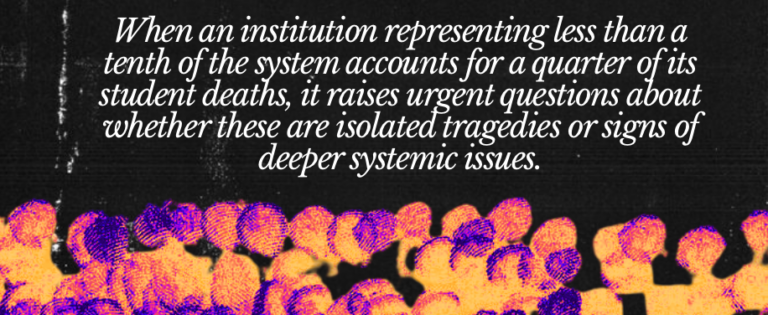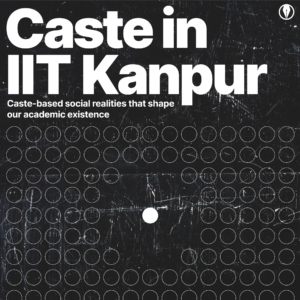In part 1 and part 2 of the series ‘How Mess Functions at IIT Kanpur’, an attempt has been made to familiarize the new incoming students with the functioning of mess. In part 1 the financial and managerial aspects were discussed with emphasis on MEC, monthly bill, and the role of HECs and residents. In part 2, the working condition of mess workers and labor law violations at messes were the focus of our analysis.
In this part, we will be discussing the Per Student Per Day (PSPD) Model. After the restart of the campus following the prolonged closure due to COVID, students noticed a sharp increase in monthly mess bills. Students in many halls have started raising this issue at different levels. FCT is of the opinion that the sudden increase in the monthly mess bill is primarily due to the absence of working HECs in halls. After the restart of the messes, Halls were working either with a few old HEC members (as many had already finished their tenure) or there was no HEC at all. While the price rise of the raw material partly explains the steep rise in BDMR, it is also a reality that the active involvement of students and HEC in mess affairs can keep the monthly bill under control. During the initial months of restart of the messes the monthly mess bills were as high Rs 110-115. At that time, the messes were following a menu prepared by the DoSA office without any consultation with students. Absence of a functioning HEC meant the students had little control over the procurement process of raw materials. In more recent times with the active involvement of HECs, BDMR has stabilized between Rs 70-80. But the fact remains that BDMR in post-pandemic time is considerably higher compared to pre-pandemic days. With the rising number of students asking about increased mess bills, the IIT-K administration is planning to introduce an alternative mess model. This alternative mess model was first introduced in 2017 and then again in 2019. On both occasions, the institute had to take back the proposals due to many limitations of that model and all-out students’ opposition.
The postponement of the mess contracts renewal for three months, which was due in February has further raised concern among the students. In May, when this renewal is planned, the majority of students will not be on campus due to semester break. In the absence of students, the institute gets a free hand to implement this new model without any consultations with or resistance from the students. As students are the primary stakeholders in the mess, they need to understand this new model to prevent its imposition in their absence.
What is PSPD Model?
To understand the PSPD model, we must first examine the tender document of 2017 which invited bids for both the Fixed Cost Service Charge ((FCSC) present mess model) and Per Student Per day (PSPD) model. Point-wise analysis of this tender document is presented below.
1. The difference in the commodity of bidding (refer to points 3(a) & 3(b) of part-1 of the tender document)
- For the FCSC model, this document states that “the Institute shall provide fixed service charge per month for providing the messing services as described in the scope of work for a tentatively fixed number of students as per the minimum wages rates applicable. However, the same shall be subject to revision, if there is any hike in the rate of minimum wages. This excludes the cost of the raw materials or inputs which are to be borne/ provided by the residents of the halls.” In simple words, for the FCSC model, contractors or the service provider bid only for the service charge to get the tender.
- For the PSPD model, this document states that “the service provider shall prepare the food in the mess by procuring raw materials and labor at its own cost as per the menu provided to them by the halls and serve it to the residents of the halls on “Per Student Per Day” basis as per the agreed rate. The service provider shall also be required to provide all related services for the preparation, serving and cleaning in addition to any other works which are defined in the scope of works.” Here for this model, the bidder bids for the complete cost of food per day while taking into consideration the raw material, manpower, and other services required in the mess.
2. Differences in the employment of workers (refer to points 26 & 27 of part-1 of the tender document)
- As per the tender document, “The cost of service under fixed cost service charge model shall remain static during the contract period taking into account the strength of 40 workers for 450 students.” For the FCSC model, the contractor must follow the students to workers ratio of (1:11.25) at all times in the mess.
- On the other hand, “the “Per Student Per Day” rate shall be inclusive of all the charges i.e., the cost of all raw materials, cost of manpower being not less than 25 workers de-facto on work every day.” Here, the institute arbitrarily comes up with a figure of 25 workers per day without mentioning the number of students who will be paying for the service.
3. Mode of payment to the vendors (refer to point 39 of part-2 of the tender document)
- For the FCSC model, all the payments to the vendors are made through the hall office against all the bills submitted within a payment cycle.
- For the PSPD model, the contractor orders all the raw materials required and makes respective payments without any involvement of the Hall office or HEC in the process.
4. Utilization of money collected from cash coupon sale (refer to point 53 of part-2 of the tender document)
- In the case of the services based on an FCSC basis, the entire realization from the sale of coupons is deposited with the hall office every month, which helps in reducing the monthly mess bill. (Refer to part 1)
- In the case of the services on a PSPD basis, the sale proceeds of coupons shall be the preserve of the contractor.
What does PSPD mean to its stakeholders?
Based on the provisions, terms, and conditions mentioned in the tender document, we must examine how PSPD is going to affect its different stakeholders and how their roles change if this new mess model is implemented.
- Students
- Students are the primary service users in the messes of IIT Kanpur. In the present FCSC model, students pay for everything required in running a mess facility. Through the Monthly-Mess-Bill, students pay for the cost of raw materials and through Mess Establishment Charge they pay for the wages, EPF & ESI of mess workers along with the service charge (profit) to the vendor. Apart from this, students actively participate in deciding the mess menu, quality of raw materials, allocation of mess tenders, selection of vendors etc. FCSC empowers the students through HECs to micromanage the mess affairs to ensure good quality food at an affordable cost. Contractors only get a fixed service charge for managing the manpower required in the mess.
- If the PSPD model becomes a reality, students will lose the decision-making authority in the mess because as per the terms of the contract, the contractor will decide on the mess menu, quality, and quantity of food based on the price which is quoted while obtaining the contract. Since the lowest bidder gets the contract, profit maximization will happen at the cost of the quality of the raw material and other services required in the mess. In such conditions, HECs will become redundant because the contract empowers the contractor to take every key decision. Thus, the students will mostly have no say in mess functioning.
- The PSPD model has been advertised as a model under which the cost of food for the students will decrease. This characteristic of the PSPD model requires a serious examination. The cost of pulses, vegetables, edible oil, cooking gas, etc. is subject to constant fluctuations throughout the year. At times if the prices of raw materials go up, will the contractor serve us the food at the same price while compromising on its profit or will it be forced to increase the cost of food? Or will it be compelled to compromise on the quality of raw materials to maintain its profit? Latter two seem more likely to take place in such a situation.
- Here we must remind ourselves of the marketing strategy of a private telecommunication company launched in the middle of the last decade. It dropped the tariffs for cellular and internet services almost to negligible amounts to gain a foothold in the market. After capturing the market, it increased the tariffs multi-folds. A similar scenario can arise in IITK messes once the PSPD is implemented in all the messes of the campus. Although this model is being sold in the name of lower food prices to the students, with time it can become even costlier than what we are paying today.
- Workers of the mess
In part 2 of the series on ‘How Mess Functions at IIT Kanpur’, we have discussed the working condition of the mess workers under the present mess model i.e., the FCSC model. It has been laid out that there is a gross violation of labor laws in the present system where for 450 students 40 workers are employed to run a mess facility. These workers are made to work for as high as 11 hours in a workday of 16 hours without any payment of overtime wages.
In the PSPD model, the administration has asked the contractors to get the same job done by 25 workers. The work that 40 workers do in the present model is supposed to be performed by 25 in the PSPD model. What is the rationale here for such a drastic reduction in the number of workers? Is it possible for 25 workers to perform the work of 40 workers without further violation of labor laws? The PSPD model paves the way for the more aggressive and naked transgression of labor laws.
In 2019 students had analyzed the PSPD model and submitted the petition titled ‘Analysis of Per Student Per Day (PSPD) mess model and petition to withdraw it from the tender document’ along with the signatures of around 3000 undergrad and postgrad students to the IITK-administration urging that the PSPD model must be scrapped. At the same time, the opposition to this new model not only came from students but also from other campus community members like faculty members and workers. Hamara Manch, a forum for the workers of the campus also published a note titled “New Model in Hostel Messes: High Cost of Cheap Food” on the introduction of PSPD in hall mess facilities highlighting its shortcomings.
Recently, some of the students have been informed by the CoSHA convenor that the institute administration had initiated the process for PSPD implementation in November 2021 by calling quotations from the contractors. Since November, no formal communication has been made from the administration to the students. It is very unfortunate that such a major change in mess policy is being planned without taking the views of the students who are the primary users of the mess facilities.
Given the above, the students must come together as one voice and demand answers to the following from the administration:
- Why was the mess tendering, that was supposed to happen in February, postponed for three months without any explanation?
- If the institute administration had been requesting a quotation on PSPD since November 2021, why has no communication with students happened till now?
- Since students pay for everything in the mess, why is the administration pushing so aggressively for the PSPD model which has been rejected by students twice? If the administration is concerned about providing cheap food to the students, why don’t they start with cheap education in the first place? Per semester fee at IITK for undergraduate students is as high as Rs 1.25 lakh.
Students must discuss this issue with HECs and through them, resolutions rejecting the PSPD model must be passed at hall levels as well as CoSHA, and Students’ Senate level.
We will end this part with the following questions to the students:
- Are we ready to have cheap food in the mess at the expense of food quality, autonomy of HECs and our power to decide what to eat in the mess or at the expense of the exploitation of mess workers?
- Can we not imagine an alternative mess model which does not perpetuate the workers’ exploitation and at the same time students can have food at affordable prices?
Written by: Forum of Critical Thinking (FCT-IITK)
Forum of Critical Thinking (FCT-IITK) is an informal group of IIT Kanpur students and community members aiming to develop a critical understanding of issues facing the institute and the country. FCT-IITK formed out of a series of discussions amongst students who were concerned about the erosion of democratic values both within the campus and in the country. This forum aims to understand the systemic reasons that underlie the problems faced by the campus community, and attempts to understand it in relation to the socio-political context we occupy within the larger body politic of the nation. Follow them @ https://www.facebook.com/iitkfct. You can reach them @ criticalthinkingforumiitk@gmail.com.











